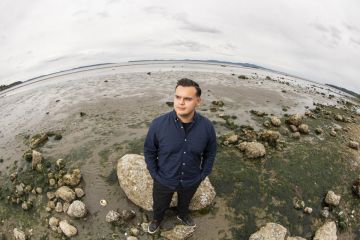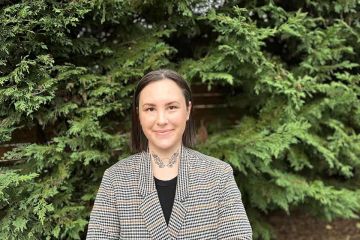Claiming the rights to the city
- Kayla Pepper
On Nov. 17, the David Lam Auditorium was packed with students and community members eager to hear Dr. Warren Magnusson (political science) deliver a lecture entitled “Occupy Victoria: Seeing Like a City” sponsored by UVic’s Centre for Co-operative and Community-Based Economy. With Occupy Victoria participants facing an injunction to end their occupation of Centennial Square, the lecture provided political theory to contextualize the social movement.
While the theme of his recent book, Politics of Urbanism: Seeing Like a City, connects to the Occupy movement, Magnusson didn’t offer easy judgements about the global demonstrations. Rather, he challenged his audience to engage critically with the city and urban spaces around them as a way to understand modern politics and the Occupy movement.
“I don’t like easy answers to questions,” Magnusson told the audience.
Magnusson’s delivery was animated and thought provoking. He posed questions to the audience to challenge how the state is characterized in everyone’s imagination. He defined “seeing like a state” as looking at the world as divided into a bunch of sovereign states that are governable by bureaucrats—top-down power structures. “Can you think about things otherwise?” he asked.
“Think of the city through the everyday fabric of the world,” he suggested. “Ask yourself, how is this space configured?” He pointed out that in a city people manage to engage in complicated patterns of self-organization and there is always a multiplicity of authorities. This relates to structures established in the Occupy movement through efforts like the general assemblies. There isn’t just one state power that governs every facet of our daily lives.
He often drew upon the thought of Henri Lefebvre, a French Marxist philosopher, to examine how citizens engage and claim rights to a city. As the city is constituted now, it only belongs to the people in a nominal way.
Magnusson made a parallel between the 1968 May events in France and the Occupy movement as movements where people claimed rights to public spaces in their cities. When Lefebevre wrote about the May events he, like the Occupy movement, was looking at issues of revolution versus reform and state versus capital.
“Nobody could figure out what it [May ’68] was about,” Magnusson exclaimed. The audience responded with laughter as people drew a comparison to the mainstream media coverage of the Occupy events.
Magnusson then described the concept of the global city. Thinking of the world as a whole city means that people need to pay attention to how places around them operate in order to “understand the world well enough that [we] can act in it.” This concept also ties into how thinking local can lead to acting globally.
“The global city is everywhere, we all live there,” Magnusson explained. He pointed to social media and internet technology as a way to foster that sense of a global community especially in relation to the Occupy movement.
He posed more questions about determining the rights to claim a life and livelihood in a city. What is the right to public space? Who is included and who is excluded? What does it mean to confront undemocratic authorities? He said that although the Occupy movement hasn't provided answers to these questions, he’s encouraged that the questions have been asked. Magnusson invited his audience to formulate their own opinions.
Some of those opinions were expressed during the lively question period that followed the lecture. Questions ranged from “what would a state look like as a city?” to “at what level is self-transformation a solution if people are inherently capitalist and greedy?”
Magnusson addressed all questions with depth and insight but did not hesitate to acknowledge limitations within his work as it is “only one way of thinking.”
Overall, his theories on cities and urbanism were closely linked back to the Occupy events at Centennial Square during the question period. Magnusson and participants alike highlighted the complexities of claiming public spaces.
“The interesting thing about this phenomenon [Occupy] is the manifestation of people that was totally unpredictable and it surprised the people themselves. Suddenly there’s this phenomenon in the world and what’s it about? It’s about claiming the right to the city.”
In this story
Keywords: politics, human rights, community
People: Warren Magnusson




